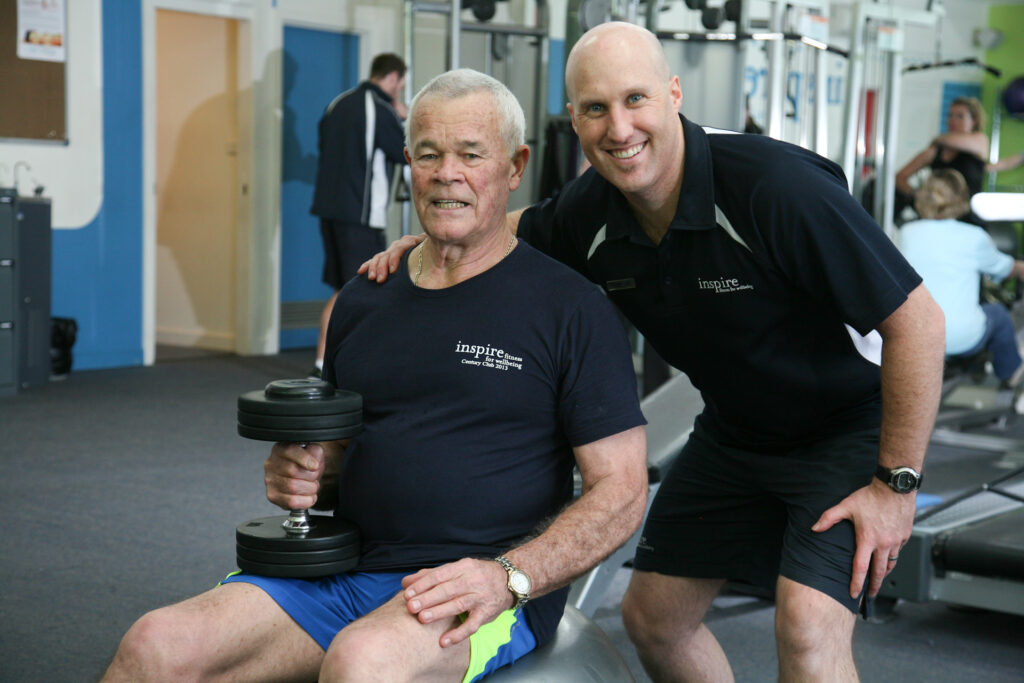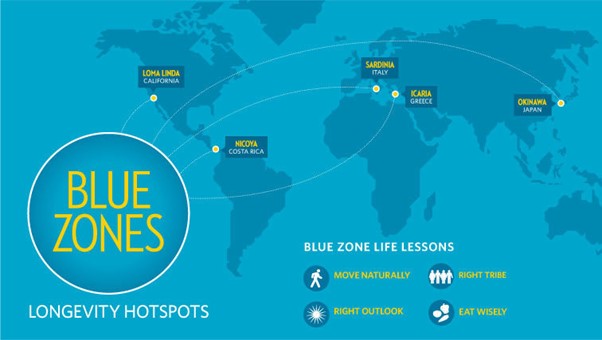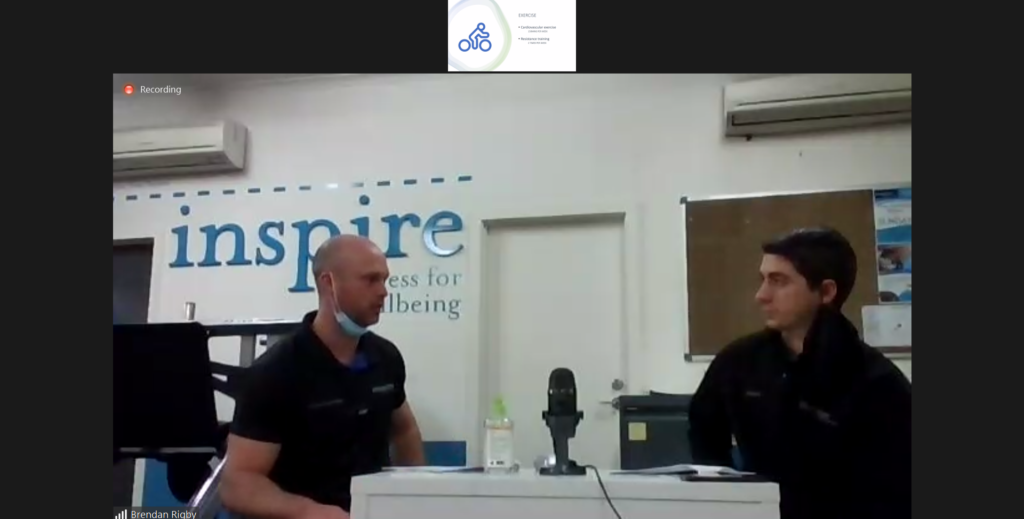Written by; Nathaniel Christoforou (Accredited Exercise Physiologist)
The latest Inspire Fitness education webinar was delivered recently on the topic of ‘Longevity: The Science of ageing’.
This presentation was hosted by Accredited Exercise Physiologists at Inspire Fitness.
Due to popular demand from many people within the community, we have provided public access to the recording of this webinar here.
Click Here to access the Webinar: Longevity: The Science of Ageing
Understanding Ageing
The webinar challenged the traditional views of ageing, in that ageing is associated with a slow and significant deterioration of health and independence, ultimately leading to nursing home admission, where we live out the rest of our years.
We wanted to highlight some of the latest research into longevity, and show you some real life examples of locations in the world living healthier for longer (aka ‘Blue Zones’), as well as the lifestyle habits from these locations that we may be able to adopt in our western world to maximize our health and longevity.
Living not only longer (lifespan), but healthier for longer (health span) is a concept we introduced early on, and wanted to focus on throughout our presentation, which begged the central Q: “What if at 60 years of age, you knew you could have up to another 50 years of good health? What lifestyle changes would you make now knowing this information?
We mirrored this to the ‘Greatest Generation,’ who were the generation born between 1901-1927.
They are termed the greatest generation as they battled through the great depression and World War 2, while greatly exceeding their life expectancy.
At their time of birth, the life expectancy for a male or female ranged from 59-62 years, but as we well know, they significantly exceeded this.
If this generation had known in their 50’s that they were potentially only halfway through their lifetime, what lifestyle changes do you think they might’ve made to prolong their health and reduce their risk for disease?

How to Increase Longevity
It is important to take the learnings from the Greatest Generation and apply these to your own lifestyle. This means to take on a proactive approach to your health.
How can we do this?
Increase your longevity by taking a preventive approach to health conditions as opposed to a treatment approach only. We have an ageing population in Australia – people are living for longer, and while this is partly due to advances in the medical world and medical treatment, the potential for prevention is even greater.
A medical, or ‘disease-based’ approach to medicine often focuses on providing a solution to a problem, without looking at WHY the problem has occurred. A disease approach often will not consider the systemic problems which might if lifestyle habits do not change.
The disease approach to medicine can be easily seen with the treatment for type 2 diabetes. A disease-approach would be to begin taking medications to control blood sugar levels.
However, a lifestyle approach, i.e. implementing regular exercise, a nutritious diet, and better sleep habits, could prevent worsening of the disease, and has even been shown to reverse the need for diabetes medications altogether.
Additionally, by focusing on a prevention approach and implementing these habits early in life, the risk of developing Type 2 Diabetes (now termed a lifestyle disease) would be significantly reduced altogether.
Our lifestyle choices account for 50-70% of our health outcomes, while genetics determine 30-50%, so while you may have a ‘genetic predisposition’ to a certain health condition because it is prevalent in your family history, your lifestyle choices are an even stronger determinant to whether you one day develop this condition or not.
Blue Zones
The Blue Zones are 5 ‘longevity hotspots’ in the world with a high prevalence of centenarians (people >100yrs). Not only are they living longer, but in better health for longer.

Here are some characteristics of each Blue Zone, and well as some of the key characteristics they all share:

It is nice to know that people in exotic places are living long and happy lives, and easy to show you some of the key habits of these locations, but the reality is for most of us living in a western lifestyle, that time and commitments generally get in the way of achieving this utopic way of living.
We cannot just teleport to these locations and live their lives, so how do we implement the teachings of the Blue Zones?
In previous seminars at Inspire Fitness, we have spoken of the ‘4 pillars of a balanced and healthy lifestyle’ – Exercise, Nutrition, Sleep and Stress.
These are all very complicated, and require individualization to each person, but we wanted to give each of you one tangible that you could take away for each and try to implement in your lives.
Exercise
Being a team of Accredited Exercise Physiologists – designing exercise program is our specialty.
Again, it would be easy for us to throw research and evidence at you, but an overarching principle from numerous research papers is that 150mins of cardiovascular exercise + 2x resistance training sessions per week is optimal for health and longevity.
Cardiovascular exercise involves anything that will raise your heart rate – walking, running, cycling; while resistance training involves challenging your body with resistance, or weight, which you can do with your body weight, and progress even further using exercise equipment, as many of you already do at Inspire Fitness.
While some of you may already be completing this, we are not all already at this point. It is important to note that significant health benefits can occur before reaching this point.
For someone currently inactive, as little as 15 minutes of exercise per day has been shown to reduce the risk of heart attack by 40%.
The key message we wanted to press with this, is that regardless of the level you are currently at, it is vital to work on progressing this. For someone already achieving 150mins + 2 gym sessions, the benefits only intensify with more, or you may choose to progress not with duration, but with resistance, or intensity.
This is where we can come in, so if you have any questions about how you can commence or progress your currently weekly exercise habits, please contact us.
Nutrition
Nutrition is the most complicated of the 4 pillars, as it has the most variable response for a given individual, to a given stimulus. What I know works for me, would not work for each and every one of you.
This is where the frustration comes from, and we see this in clients who are “doing everything right” but not achieving a result.
The overarching principle in nutrition is that you have to be malleable – you have to assume that if something doesn’t work for you, and you have tried it correctly, than this is okay, and there is a different approach that will work for you. Again, this is where we, or a dietician can come in and assist you with individually tailored advice, but here is one method that you can try to see if it does work for you:
Intermittent fasting: this has been shown to reduce inflammation, decrease insulin levels, and promote weight loss due to the reduced window in which you are eating.
For example, a 16:8 method purports that for a day, everything you eat falls within an 8-hour window (e.g. 12-8pm), and for the remaining 16 hours, you are in a fasted state (half of which you hopefully spend sleeping).
If you have never tried this, it might be worth a try. To start with, I would recommend trying this on 1 day of the week, and at a maximum of 2-3 times a week.
It is important to be mindful of malnutrition, so if you are experiencing any ‘red flags’ such as significant fatigue/energy, consider expanding your eating window, or focus on intaking adequate nutrition in your 8-hour window. It is important to still uptake adequate nutrition during the eating period.
Sleep
There is a consensus in research that 7-9 hours of sleep is optimal for our health and longevity. A good way to determine this is to go to bed when tired and wake up when refreshed without an alarm. Any sleep less than this will presumably lead to sleep debt, and its subsequent consequences, these may include:
- Fatigue
- Reduced alertness
- Weakened immune system
- Inflammation
- Increased risk of developing cardiovascular disease, hypertension, diabetes, obesity, cancers and depression.
Adults who sleep <6hrs/night are 55% more likely to become obese. While adults with sleep issues have as high as an 80% increased risk of developing Type 2 Diabetes.
We had a question asked on the night on how to ensure adequate sleep hygiene, here are some good resources you can used to monitor this:
- https://www.sleephealthfoundation.org.au/pdfs/Good-Sleep-Habits.pdf
- https://headspace.org.au/assets/Factsheets/HSP225-Sleep-Fact-Sheet-DP3.pdf
Stress
Stress can be significantly detrimental to both our physical and mental wellbeing, and it is important to ensure that we are engaging in adequate self-care to reduce overall stress levels. Here are some strategies to manage or reduce our stress:
- Exercise
- Eating well
- Mindfulness/meditation
- Talking to someone – a professional, loved one or friend
- Diary – write down thoughts
- Time management
- Healthy work-life balance
- Hobbies
- Socialising
- Dedicated self-care time
The key takeaways from our presentation were that ageing does not have to be this story of a sad and slow deterioration of health, while there are lifestyle habits that we can implement (as outlined above) which can not only maximise our lifespan, but our health span.
This has been scientifically proven by the findings of the Blue Zones, and it is essential to try and implement some of these habits to maximise our longevity.
If you are 60 years old, and could live another 50 years of good health, would you take a proactive approach and implement these teachings now?
Finally, with medical advances, we are also better able to track and predict our risk for chronic health conditions, to address and prevent these early. These measures may include body composition scans, blood pressure readings, blood analysis, cardiovascular fitness assessments and more.
At Inspire Fitness we have implemented a ‘6-week Health and Longevity Program,’
We not only want to tell you what these positive lifestyle habits look like but give you an opportunity as to how you might implement these into your life, with our guidance and an individually tailored approach.
This program will include a Biometric Health and Longevity Assessment, design of an individually-tailored exercise program, mid and end-point reassessments, as well as a dedicated additional seminar further discussing some of the ‘pillars’ discussed in this blog.
If you are interested in joining this program, please contact us on 9857 3007.

